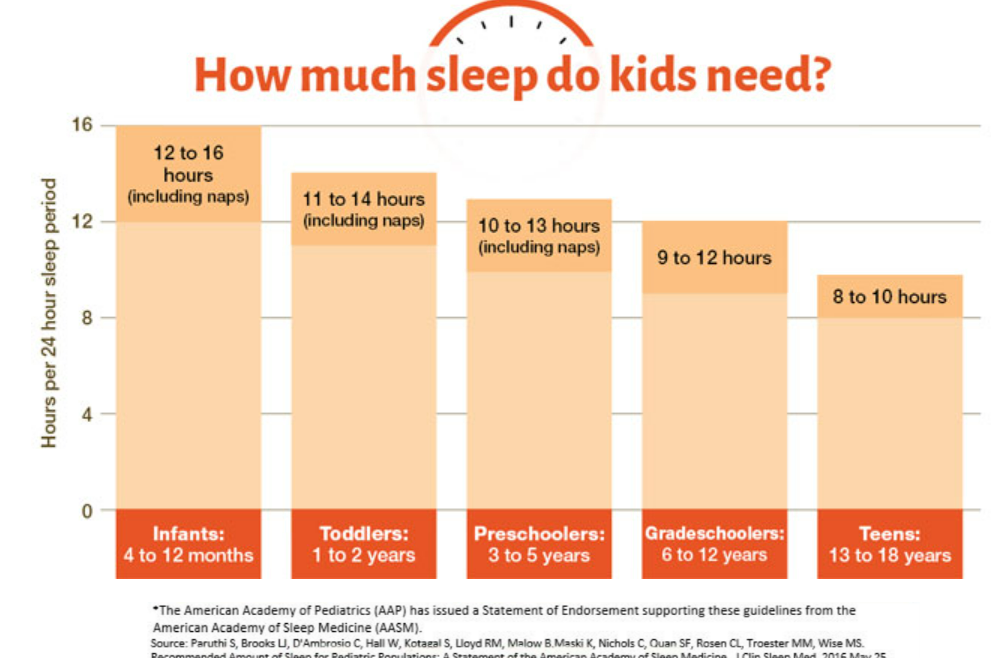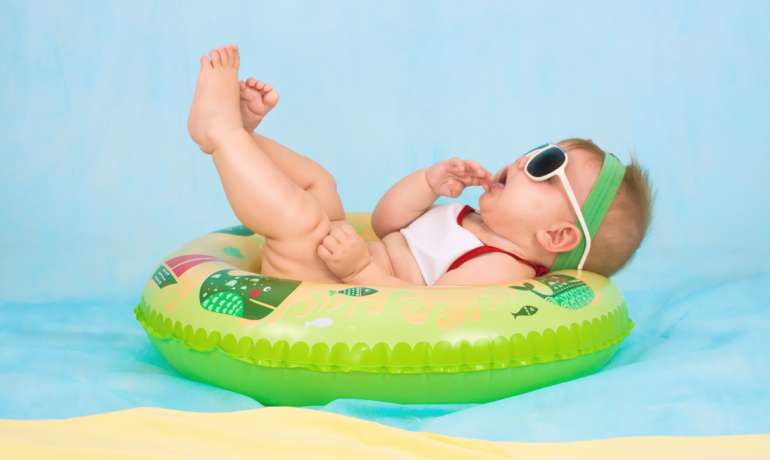Sleep is more important than most people realize! The amount and quality of sleep we have can affect our safety, how alert we are, as well as our memories, moods, behavior, and learning abilities. Sleep specialists recommend 12-16hrs a day for infants 4mo-12mo, 11-14hrs for 1-2 years, 10-13 for 3-5 years, 9-12hrs for 6-12 years, 8-10hrs for 13-18years. Read below for some tips on good sleep hygiene and an overview of common sleep misbehaviors. Remember every child has different sleep needs so try and do what is best for each individual child and with what works for your family.
6 Sleep Hygiene Tips
- Have a consistent bedtime and wake up time (including weekends!)
- Turn off screens 1-2hrs before bed
- Keep electronics out of the bedroom
- Avoid heavy meals or caffeine right before bed
- Be active during the day (avoid heavy exercise right before bed)
- Try a warm bath, warm milk or bedtime story to help wind down
Sleep Misbehaviors: Overview
Climbing Out of the Crib
Premise Once a child climbs out of a crib with the springs on the lowest setting, he or she will definitely try to climb out again and eventually will fall and possibly get hurt.
Response Correct this hazard on the same day your child climbs out. One solution is to put your child’s mattress on the floor. Another is to leave your child in the crib with the crib railing down and a chair next to the bed so he or she can easily get out. Eventually you can transfer your child to a floor-level bed.
Nap Refusal
The rule “Don’t leave your room during quiet time.” Every day after lunch, you or your child’s caretaker can expect him to spend 60 to 90 minutes resting in his room. During this time he may read, but may not turn on the radio or TV.
Discipline technique Return your child to his room if he comes out before 60 to 90 minutes are up. If he comes out a second time, close the door temporarily.
Bedtime Negativism
Examples Your child refuses to put on her pajamas, lie down, close her eyes, or stay in bed.
The rule “Stay in your bedroom after we put you to bed.”
Discipline technique Natural consequences. Your child will eventually become tired and go to sleep. Your child can’t be forced to fall asleep. Insisting on any of the actions mentioned above is unnecessary – it doesn’t matter if your child sleeps on the floor in her daytime clothing.
Playing and Talking in the Bedroom After Bedtime
The rule “After bedtime you have to be quiet so that your mind will be able to go to sleep.”
Discipline technique Logical consequences. For every night that children stay up, fight, play, or make noise, they will be put to bed 15 minutes earlier the following night. If one child in particular tries to keep the other one up, that child can be sent to bed 1 hour earlier.
Praise your children the following morning for going to sleep without a fuss.
Wandering or Prowling About During the Night
Examples Some children awaken during the night and move about the house getting into trouble. They may raid the refrigerator or leave it open. They may watch TV, or turn on the stove or water faucet. Unlike sleepwalkers, they are awake.
The rule “If you wake up during the night, except for going to the bathroom, you have to stay in your room.”
Discipline technique Nighttime restriction to the bedroom. Because of the safety issues, until children are safety-conscious (namely, at age 4 or 5), they need a barricade to keep them in their bedrooms. This can be a gate, plywood plank, or locked door. A chain lock (hotel lock) can keep your child in the room yet allow him to open the door partially in case he needs to cry out for someone. If your child is one who needs to urinate during the night, a pot can be placed in his room. After 4 years of age most children will stay in their rooms if they awaken early and have been told they’re expected to stay and play quietly.
Sleeping with the Parents
The rule “Stay in your room during the night. Starting tonight we sleep in separate beds. We have our room and you have your room. You have your bed and we have our bed. You are too old to sleep with us anymore.” Since many normal children sleep with their parents during the early years, the parents must decide if they want to discourage it.
Discipline technique If your child crawls into your bed, she should be sternly ordered back to her own bed. If she doesn’t move, she can be escorted back immediately without any conversation. If your child usually doesn’t awaken you when she crawls into your bed, use a signaling device that will awaken you if your child enters your bedroom (for instance, a chair placed against your door that will fall when it is moved or a loud bell attached to your doorknob). Some parents simply lock their bedroom door. Another approach is to put a barrier in front of your child’s bedroom door.
Wanting to Choose His or Her Own Bedtime
Assumption Adolescents should be able to take care of their own sleep requirements before going off to college.
The rule “Stay up as late as you want, but it’s your responsibility to get yourself up in the morning with an alarm clock and to get to school on time. Also, you can’t make any noise after the rest of the family has turned in.”
Discipline technique Natural consequences.
Resources:
- Healthy sleep habits: How many hours does your child need? HealthyChildren.org. (n.d.). Retrieved October 20, 2022, from https://healthychildren.org/English/healthy-living/sleep/Pages/Healthy-Sleep-Habits-How-Many-Hours-Does-Your-Child-Need.aspx
- American Academy of Sleep Medicine (AASM): Sleep: Medical society. American Academy of Sleep Medicine – Association for Sleep Clinicians and Researchers. (2022, October 17). Retrieved October 20, 2022, from https://aasm.org/
- Pediatric Advisor 2006.4; Copyright © 2006 McKesson Corporation and/or one of its subsidiaries. All Rights Reserved. Written by B.D. Schmitt, M.D., author of “Your Child’s Health,” Bantam Books.


